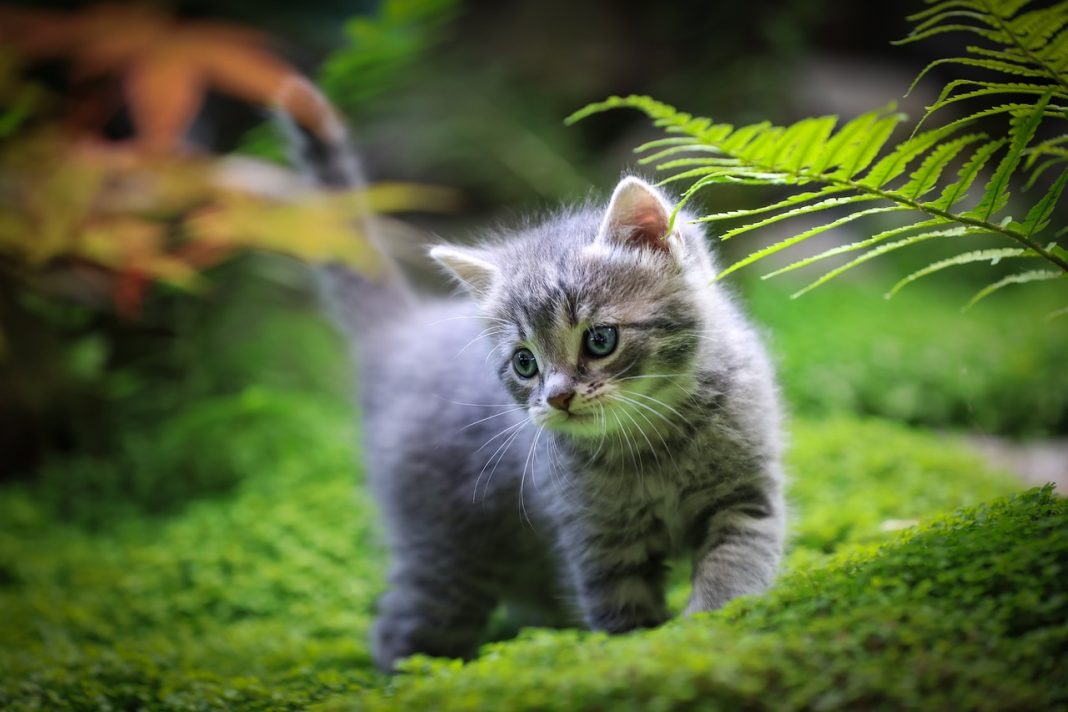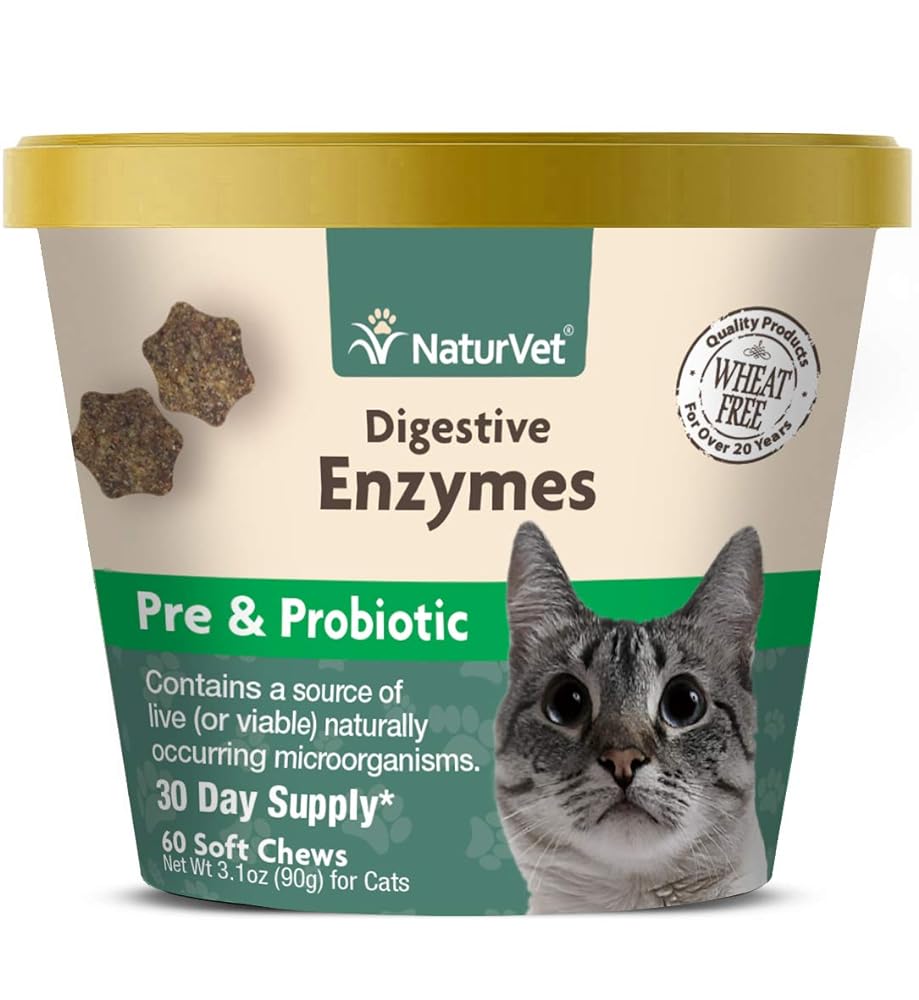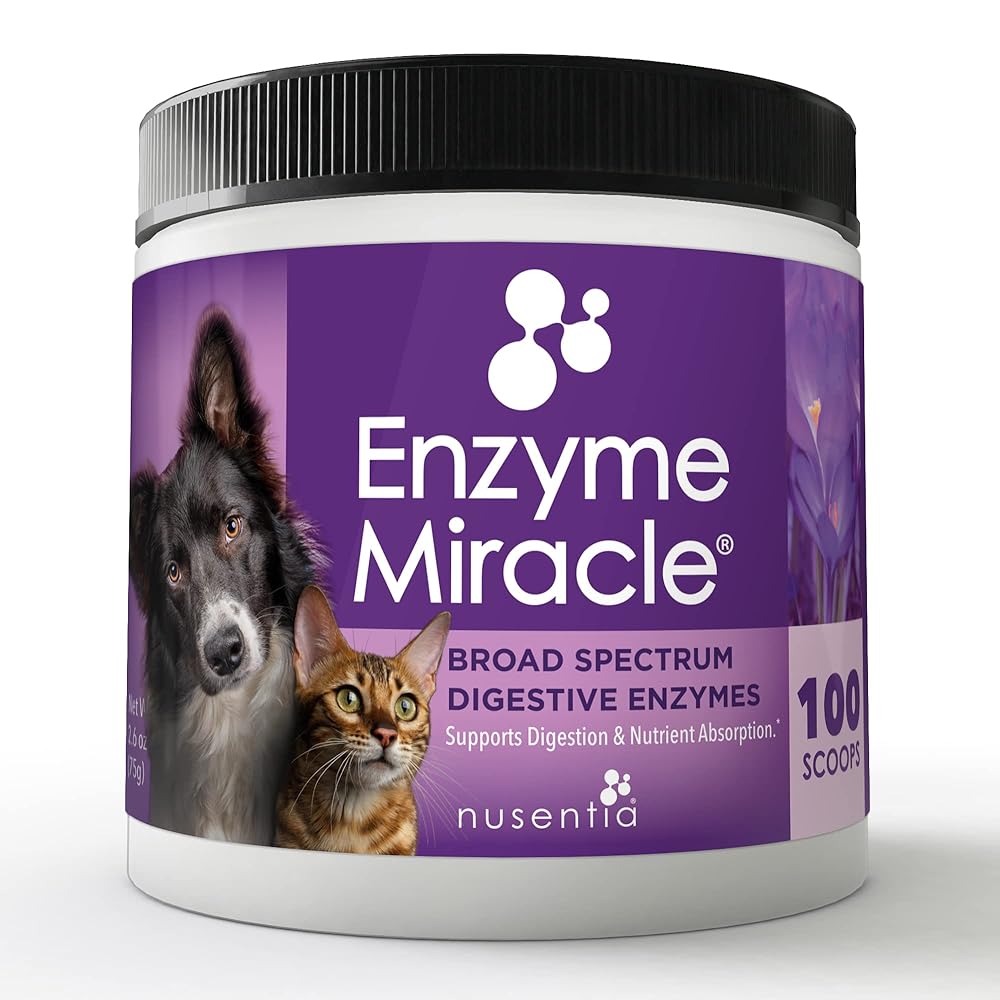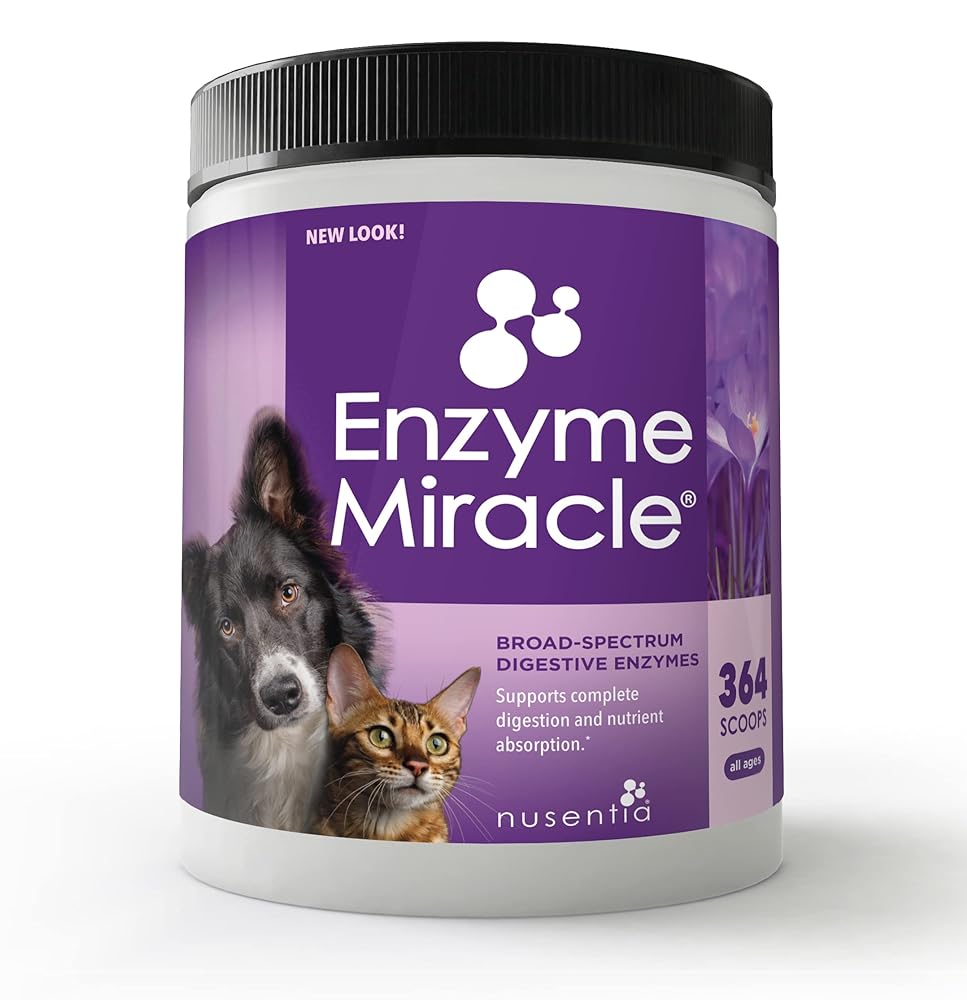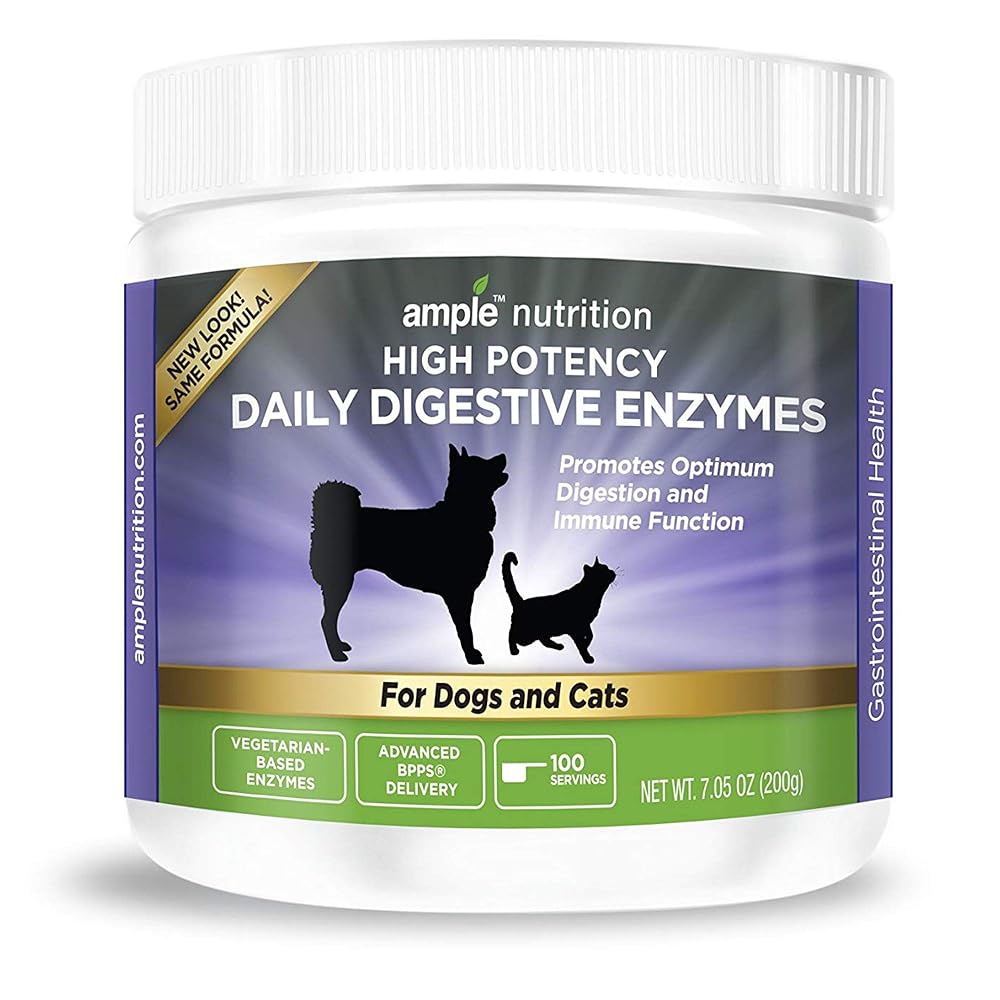Looking for the Best Digestive Enzymes for Cats? Ensuring optimal digestion is crucial for your feline friend’s overall health and well-being. As our pets age or encounter dietary challenges, their digestive efficiency can sometimes wane. Digestive enzymes play a vital role in breaking down food, aiding in nutrient absorption, and promoting a healthy gut. In this article, we will delve deep into the benefits of these enzymes and provide a comprehensive guide to selecting the most effective products for your kitty’s unique needs. Join us as we explore the world of feline digestive health.
1. NaturVet – Digestive Enzymes For Cats Plus Probiotics
NaturVet Digestive Enzymes for Cats Plus Probiotics is a supplement that aims to support a healthy digestive tract in cats. It contains enzymes and probiotics that assist in the absorption of vitamins and minerals from food, leading to better utilization of nutrients and increased energy. This product is suitable for cats over 12 weeks old and can be beneficial during diet changes or food transitioning.
2. Dr. Mercola, Bark & Whiskers, Digestive Enzymes
The Dr. Mercola Bark & Whiskers Digestive Enzymes for Cats & Dogs is a product designed to help pets with sensitive stomachs or those on kibble diets. It contains 150 scoops (4.23 oz.) of a non-GMO, gluten-free, and soy-free formula. The digestive enzymes are specially formulated to handle the heavy carb load of highly processed diets, while also containing lower levels of pancreatic enzymes to avoid potential irritation. The product is backed by a 30-day money-back guarantee.
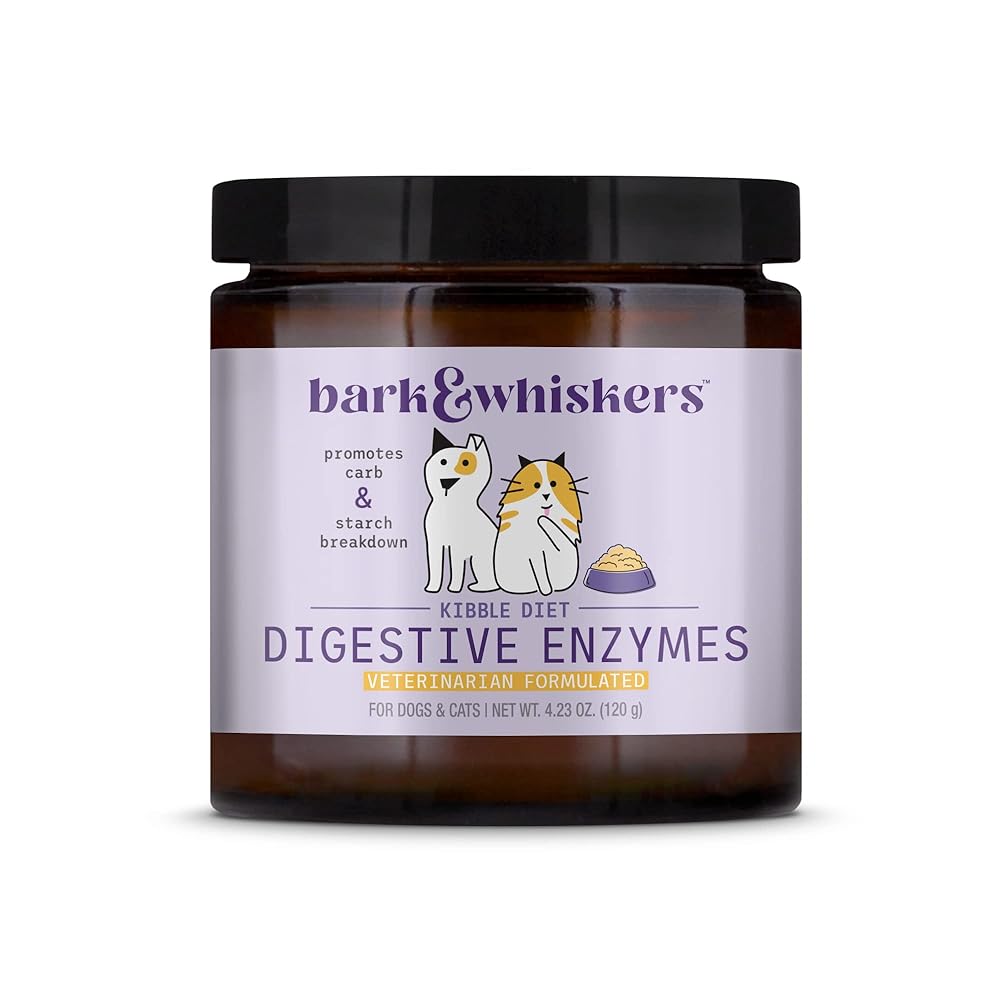
3. Enzymes for Cats & Dogs: Enzyme Miracle
Enzyme Miracle® is a natural and safe enzyme supplement for cats and dogs that is designed to improve digestive health, manage weight, and address pancreatic concerns. Formulated with 11 types of plant-based enzymes, it supports metabolic functions and helps combat digestive stress symptoms such as shedding, indigestion, lethargy, yeast issues, and skin problems. The unflavored powder is easy to use and can be mixed with pet food, making it suitable for pets of all ages and stages, including puppies, kittens, and senior animals.
4. Enzymes for Dogs & Cats
Enzyme Miracle is a powder supplement formulated for dogs and cats of all ages and stages. It contains 11 types of plant-based systemic and digestive enzymes that support nutrient absorption and promote overall health. The supplement is easy to use and can be mixed with pet food. It is made in the USA at a GMP-certified facility and is recommended by veterinarians.
5. Ample Nutrition Digestive Enzyme
The Ample Nutrition Digestive Enzyme is a powdered blend designed to aid in nutrient absorption and digestion for both dogs and cats. It claims to boost energy and support various aspects of pet health, including the immune system, skin, coat, and oral health. The product contains nine enzymes specifically chosen to help break down carbohydrates, proteins, and fats. Additionally, it is made with patented technology to stabilize the enzymes and does not contain any meat, soy, yeast, gluten, or chemicals, making it suitable for pets with food allergies or those who are seniors or underweight.
6. Animal Essentials Plant Enzyme & Probiotics Supplement
The Animal Essentials Plant Enzyme & Probiotics Supplement is designed to support the digestive health of dogs and cats. It contains plant enzymes that help break down fats, carbohydrates, cellulose, and protein, allowing for better nutrient absorption. The supplement also includes probiotics, which promote a healthy immune system and reduce flatulence. It is recommended to sprinkle the supplement over food for optimal benefits.
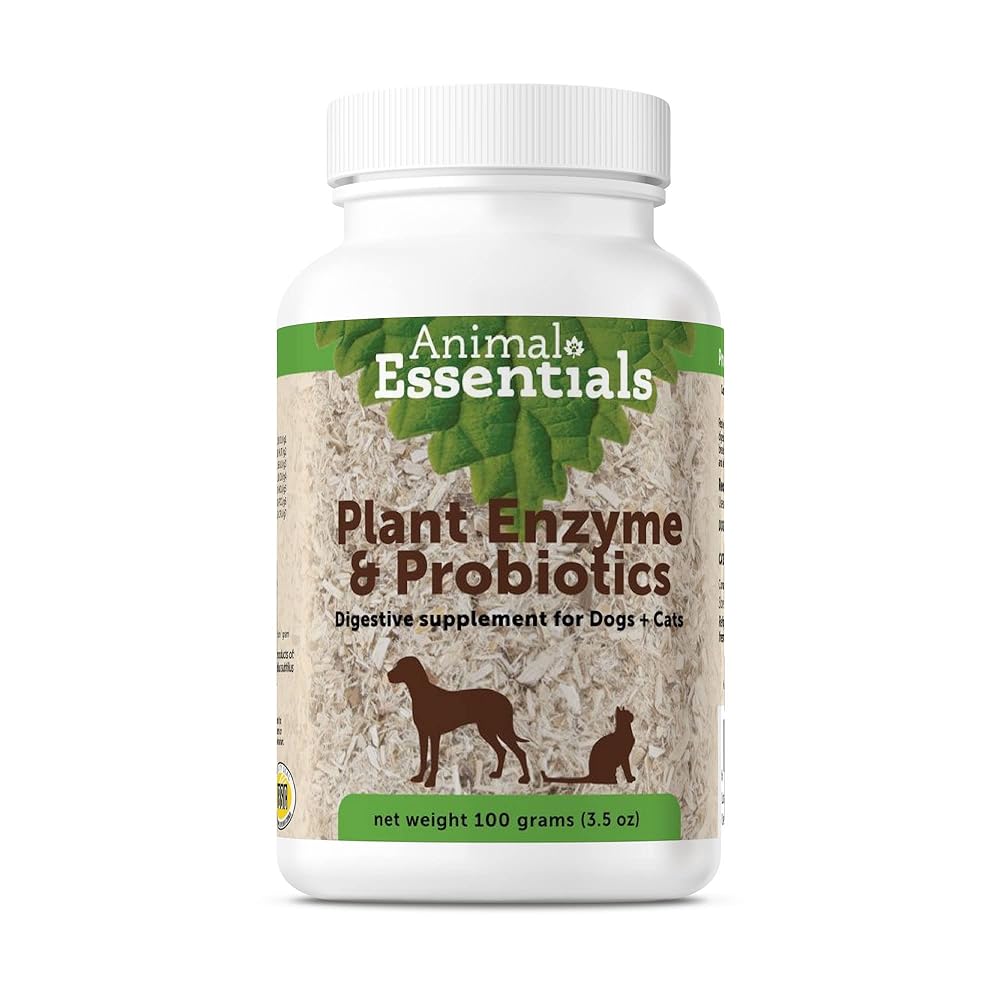
What Are The Benefits of Digestive Enzymes for Cats?
Digestive enzymes play a pivotal role in ensuring that cats can efficiently break down and absorb nutrients from the food they consume. Here are the benefits of digestive enzymes for cats:
- Optimal Nutrient Absorption: Digestive enzymes aid in breaking down food molecules like fats, proteins, and carbohydrates, ensuring that cats derive the maximum nutritional benefit from their meals.
- Reduced Digestive Upsets: Some cats may suffer from indigestion or have difficulty processing certain foods. Enzymes can help in easing such digestive disturbances, reducing instances of gas, bloating, or diarrhea.
- Support for Pancreatic Health: For cats with pancreatic insufficiency, where the pancreas doesn’t produce enough enzymes, supplemental enzymes can provide the necessary digestive support.
- Aid for Aging Cats: As cats age, their natural enzyme production may decline, leading to less efficient digestion. Providing them with digestive enzyme supplements can help maintain their digestive health as they grow older.
- Assists in Food Transitions: If you’re switching your cat’s diet, digestive enzymes can aid in this transition by helping them better digest the new food and reducing potential gastrointestinal upsets.
Always consult with a veterinarian when considering adding digestive enzymes to your cat’s diet to ensure it’s appropriate for their specific needs.
What Should I Consider When Purchasing a Digestive Enzyme for Cats?
When purchasing a digestive enzyme for cats, it’s crucial to consider several factors to ensure that the product is both effective and safe for your feline friend. Here are some considerations:
- Specific Enzymes Included: Ensure the supplement contains the main enzymes like protease (for proteins), lipase (for fats), and amylase (for carbohydrates). These are vital for proper digestion in cats.
- Natural vs. Synthetic: Ideally, look for products with natural sources of enzymes. Natural enzymes, often derived from plants or animal tissues, tend to be more effective and gentler on the stomach.
- Additives and Fillers: Check the ingredient list for unnecessary fillers, artificial colors, or preservatives. It’s best to choose a product with minimal to no artificial additives.
- Taste and Palatability: If the supplement isn’t palatable, your cat is unlikely to consume it willingly. Some products are flavored or come in a form that cats find appealing.
- Form of the Supplement: Digestive enzymes come in various forms, including powders, chews, capsules, and liquids. Consider what form would be easiest to administer to your cat and integrate into their diet.
- Recommendations and Reviews: Look for products that come highly recommended by veterinarians or have positive user reviews from other cat owners.
- Specific Needs: Some enzyme supplements also contain probiotics or other ingredients beneficial for gut health. If your cat has particular digestive issues, look for products that address those specific concerns.
- Manufacturing Standards: Ensure that the product meets high-quality standards. Brands that adhere to Good Manufacturing Practices (GMP) or have undergone third-party testing offer added assurance of their product’s quality.
- Price and Value: While it’s essential to find an affordable option, it’s also crucial to ensure you’re getting good value for your money. Sometimes, investing a bit more in a high-quality product can be more beneficial in the long run.
- Consultation with a Veterinarian: Before adding any supplement to your cat’s diet, it’s always best to consult with a veterinarian. They can provide recommendations tailored to your cat’s unique needs and health status.
Remember that while digestive enzymes can be beneficial, they should be used as a part of a holistic approach to your cat’s health, considering diet, exercise, and regular veterinary care.
Frequently Asked Questions About Cat Digestive Enzymes
1. What are digestive enzymes for cats? Digestive enzymes are proteins that help break down and digest food. For cats, these enzymes assist in breaking down proteins, fats, and carbohydrates, facilitating smoother digestion and better nutrient absorption.
2. Why might my cat need a digestive enzyme supplement? Some cats might have insufficient natural enzyme production, suffer from certain digestive disorders, or consume foods that are harder to digest. Providing a digestive enzyme supplement can help improve digestion and nutrient absorption in these cases.
3. Are there any side effects associated with giving my cat digestive enzymes? Most cats tolerate digestive enzymes well. However, some might experience loose stools, gas, or stomach upset. Always start with a recommended dose and monitor your cat for any adverse reactions.
4. How do I administer digestive enzymes to my cat? Digestive enzymes come in various forms, including powders, chews, capsules, and liquids. Depending on the type, you can sprinkle it on their food, give it as a treat, or mix it with a wet diet.
5. Can I give my cat human digestive enzymes? It’s essential to use enzymes specifically formulated for cats. Human digestive enzymes might not have the correct balance of enzymes suitable for a cat’s dietary needs.
6. How quickly will I see results after starting my cat on digestive enzymes? While some cat owners report improvements within days, it might take several weeks for others. It’s crucial to give the supplement consistently and monitor your cat for changes in digestion or stool consistency.
7. Are there any foods that naturally contain digestive enzymes? Yes, raw foods, particularly raw meats, often contain naturally occurring enzymes. However, cooking destroys many of these enzymes, which is why cats on a cooked or processed diet might benefit from enzyme supplementation.
8. Can I give my cat digestive enzymes alongside other supplements? Generally, digestive enzymes can be given alongside other supplements. However, always consult with a veterinarian when adding multiple supplements to ensure there are no adverse interactions.
9. Will digestive enzymes help with my cat’s hairballs? While digestive enzymes primarily aid in food digestion, they can potentially help with hairballs by promoting a smoother digestive process. That said, they are not a direct remedy for hairballs.
10. How do I store digestive enzyme supplements? Storage recommendations can vary based on the product. Many enzyme supplements are best stored in a cool, dry place, away from direct sunlight. Always check the product label for specific storage instructions.
Final Summary: The Best Digestive Enzymes for Cats
In this article, we reviewed the Best Digestive Enzymes for Cats, emphasizing their significance in promoting optimal gut health. Ensuring your feline has a well-functioning digestive system is paramount for their overall well-being. With the right enzyme supplement, you can provide your cat with the essential support they need to process their food efficiently and absorb crucial nutrients. Remember to always consult with your veterinarian before introducing any new supplement into your cat’s diet. Your feline friend deserves the best, and a healthy digestive system is a step in the right direction.

